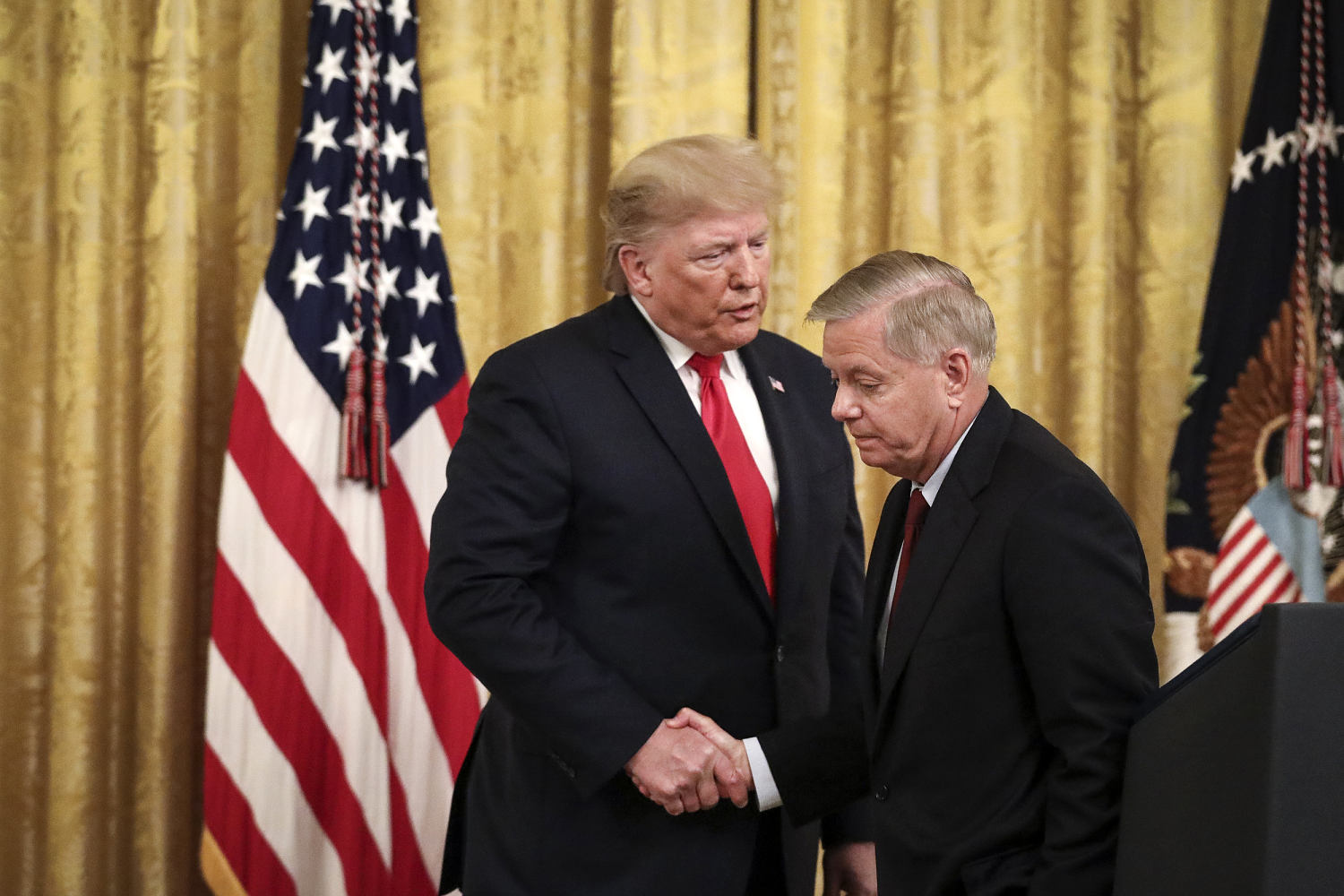A loan, with a country’s natural resources as collateral


WASHINGTON — Working to salvage an aid package to Ukraine, Republican senators pitched an idea to former President Donald Trump that they thought he’d like: Instead of a grant, the U.S. would give the country a loan that would be backed in some fashion by Ukrainian rare earth minerals worth trillions of dollars.
GOP lawmakers knew they needed Trump’s support if they were to ensure the ex-president wouldn’t use his clout in Congress to sink the aid package that Ukraine needed to fend off Russia’s invasion.
That specific plan didn’t make it into the final legislation that President Joe Biden signed into law last month. Ukraine received a loan rather than a grant — meeting Trump’s threshold requirement — though there was no mention of the country’s minerals as a potential means of repayment.
Still, Trump liked the concept, GOP lawmakers who spoke to him said, and if he wins the election, some envision a new model taking hold in which the U.S. structures foreign aid not as grants, but instead as loans with countries putting up natural resources or other valuable assets as collateral.
“If Trump wins, you’ll see more of this, not less,” said Sen. Lindsey Graham, R- S.C., one of the senators who spoke to Trump about the aid package. “This will be a new way of delivering aid. I’ve learned from these long, drawn-out conflicts that the public gets weary. So, it’s past time to be creative.”
Sen. Ted Cruz, R-Texas, said in an interview that he hasn’t studied the idea, but “I do think it makes a lot of sense that the money we provide to Ukraine be treated as a loan and not a gift. There is an enormous need for rare earth minerals. And so, finding a way to utilize those minerals to benefit America and Ukraine seems like a common-sense step.”
Some foreign policy analysts disagree. Smaller countries receiving such loans may not want to see valuable natural resources swallowed up by richer nations with the leverage to dictate financial terms.
Such an arrangement smacks of colonialism and is unlikely to endear the U.S. to nations forced to part with singular natural resources in return for valuable aid, one analyst said. China, for example, has engendered a certain amount of ill will internationally by lending money on onerous terms that smaller, poorer countries have been hard-pressed to repay.
“It would be reaffirming the idea that rich countries are only interested in their [smaller nations’] physical assets and wealth and are not really interested in development,” said William Reinsch, a senior adviser at the Center for Strategic and International Studies who specializes in international trade and economic policy. “It would make our relations with these countries more difficult — which is not to say they wouldn’t do it, but they’d be unhappy with it.”
Trump views foreign affairs as a cost-benefit proposition, in some measure. As president, a priority of his was wiping out U.S. trade deficits with other countries. He complained loudly about NATO allies that failed to meet obligations to spend 2% of gross domestic product on defense, going so far as to say in February that he’d let Russia “do whatever the hell they want” to European nations that didn’t meet their financial burdens.
A spoil of America’s costly war in Iraq should have been the country’s oil reserves, he told NBC News in 2016.
“We go in, we spent $3 trillion. We lose thousands and thousands of lives, and then look, what happens is we get nothing,” he said at the time.”
“Now, there was no victor there, believe me. There was no victory. But I always said, take the oil,” he added.
“Trump has been this way from Day One,” Graham said, explaining Trump’s position. “He didn’t mean literally, ‘Take their oil.’ He said we should have had oil as collateral because they could pass back.”
Ukraine has “a lot of critical minerals, trillions potentially,” Graham added. “Get them back on their feet. And if they become a robust economy, then pass back. If they don’t, we understand. But his [Trump’s] point is you need to have some leverage and loans give you leverage and he thinks the American taxpayer would be more supportive of approaches like this.”
Neither the White House nor the State Department commented on the prospect of asking other nations to put up valuable natural resources as collateral in return for American aid.
Asked about Trump’s view, campaign spokesperson Steven Cheung said in a prepared statement that the former president “believes European nations should be paying more of the cost of the conflict [in Ukraine], as the U.S. has paid significantly more, which is not fair to our taxpayers.”
Lawmakers in both parties recognized that Trump coming out against the aid package to Ukraine could have sunk the bill and crippled Ukraine in the two-year-old war with Russia. They saw an opportunity to win him over in February, right after Trump wrote on his Truth Social site on Feb. 10 that a loan is the only acceptable way to dispense foreign aid.
Soon after Trump’s post, GOP lawmakers arranged a conference call with Trump that included Graham, Sen. Markwayne Mullin, R-Okla., and others, in which they aired the possibility of linking Ukraine’s mineral supply to the aid package.
Trump was on board “immediately,” Mullin said.
“None of us [the lawmakers] could have made this deal happen,” Mullin said in his office on Capitol Hill. “It hinged on Trump being comfortable with it because he gives the Republicans in a political year the political cover. But it’s also sound policy, too.”
“Right now, we’re getting it [mineral resources] from China. It’s everything we need to make the chips and the batteries — a lot of things that we need. So, it would be great to do business with an actual friend or ally of ours, rather than with an adversary.”







